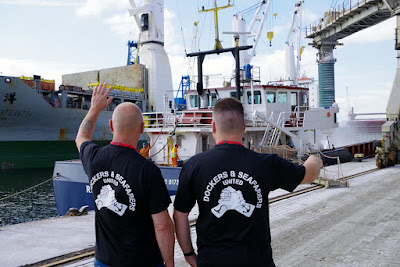I am glad to hear that after a two-year forced interruption due to the pandemic, the ITF Baltic Week of Action will be held again this year in September. Albeit small-scale and rather symbolic, it embodies the idea of immediate workers' solidarity across national, professional, organizational and bureaucratic boundaries. It can be read as a seedbed for a holistic cross-sectoral politics of solidarity from below, as we need it more than ever today, in times of increasingly self-and all-destructive late capitalism.
Is this idea an unrealistic pipedream? This is a typical objection from bureaucrats and narrow-minded people who don't realize how much the ground is burning beneath our feet. In a contribution to the hopefully soon to be published "Handbook of the Political Economy of Work", I try to develop such a strategic vision on a materialist basis.
The sea is a transport route for people and goods, a reservoir for food (fishing and aqua farming), a source of raw materials (offshore mining), energy (both fossil fuels such as oil and gas, and renewable ones such as wind and tidal power), a space of military conflict, human recreation (or the illusion that the modern tourism industry sells for that purpose) and, last but not least, a place of human contemplation and inspiration. The oceans are the fluid that enables and holds together the economic cultural and ecological existence of humanity as a global species.
I remember, when one of the traditional East German shipyards, Volkswerft Stralsund, slid into insolvency (not for the first time) in the fall of 2012, Hamani Amadou, Inspector of the International Transport Workers' Federation ITF, from neighboring Rostock paid a spontaneous visit to the shipyard workers, accompanied by a team of volunteers, dock workers from Lübeck and Rostock. Actually, they wanted to inspect incoming ships from flag of convenience states for compliance with minimum collective bargaining standards as part of the international "Baltic week of action".
Why were they here, at a shipyard, in the organizational area of the German metalworkers' union IG Metall?
"This is where the ships are built on which the seafarers we organize are sailing, the ships our members load and unload in the ports," Hamani said. "Seafarers, dockers, shipyard workers - we are one family. If you suffer, we suffer too."
What may sound like sentimental maritime poetry is actually nothing more than straight prose. Since the 1990s, the conditions under which workers in the maritime or ocean-related economy perform their work have been subject to similar or even identical trends. Accelerated capitalist globalization, the financialization of the economy, the triumph of neoliberalism have led to increased de-unionization, precarization and devaluation of labor and the pitting of workers against each other in highly fragmented global labor markets. New technological possibilities have not mitigated the socially destructive consequences of these developments, but rather exacerbated them. A cross-sectoral, integrated theoretical and political approach to maritime work is therefore more necessary than ever.
Of course I know, that the practice of trade unions is still far from that holistic, cross-sectoral approach. So this has to be changed. It has to be done. It's that simple.
(Thanks to all the friends and companions who inspired and encouraged me to maritime writing.)
